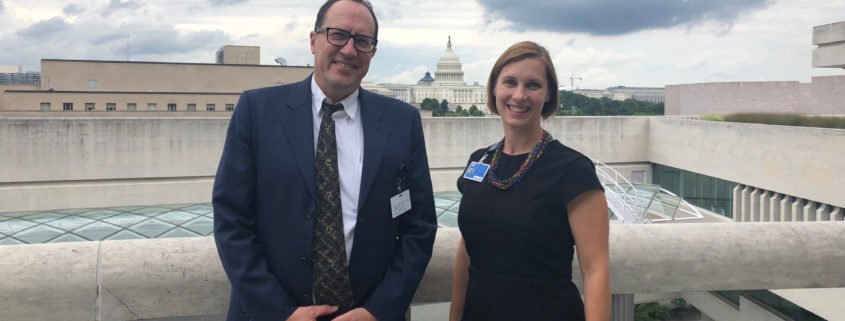Mr. Wenberg goes to Washington: SSGA executive director visits embassies, Capitol Hill
Eric Wenberg, executive director of the Specialty and Soya Grains Alliance, visited two embassies last week in a flurry of meetings in Washington, D.C.
To start the week, Wenberg made a follow-up trip to the Embassy of Japan, his first since visiting the embassy during his first week on the job in March 2019. Japan has been a longtime consumer of U.S. soybeans. In 2017, the country imported more than $1 billion worth of whole soybeans and soybean meal. The purpose of the visit was to invite embassy officials to events in the future. Expect more news soon.
Later, Wenberg joined U.S. soy industry farmer representatives from the American Soybean Association, United Soybean Board, and state QSSBs in a meeting organized by the U.S. Soybean Export Council (USSEC) to learn more from USDA/Foreign Agricultural Service Deputy Administrator Mark Slupek about plans for the Agricultural Trade Program (ATP) 2.0. The soy industry received additional funding in the second tranche and SGGA also will receive a top up to assist its overseas marketing efforts. SSGA is currently activating its $1.5 million USDA grant with support from USSEC to complete a portal to connect soya and specialty grain exporters with clients through digital networking, brand the United States as a top origin for identity preserved soya and grains, and other international activities.
Northern exposure
Tuesday morning, Wenberg met with American Farm Bureau and the U.S. China Business Council to discuss resolution to the trade dispute with China. That afternoon, he visited the Canadian Embassy, and met with agriculture counselor Christine McKee. Both parties agreed on the need to pass the USMCA (aka the new NAFTA). Canada is the top agricultural exports for 28 U.S states. In total, U.S. agricultural exports to Canada have increased 46 percent over the past decade.
“We had a very productive conversation with Canada and learned more about the importance of trade between our two countries, especially in the agriculture sector,” Wenberg says. “We look forward to future meetings.”
Wenberg then met with staff from the U.S. House Agriculture Committee. He talked trade issues and the prospect of passing USMCA by the end of the year. Wenberg explained SSGA’s mission to the committee staff and highlighted the need for increased transportation upgrades. Since the trade war began last year, agricultural transportation costs are up about eight percent.
For his final meeting, Wenberg visited the headquarters of the Ag Transportation Coalition, where he met with Executive Director Peter Friedmann. Wenberg discussed the strides SSGA has made since its formation. Friedmann encouraged future partnership, and expressed his admiration for the new organization and received assurances from Wenberg that it will continue to devote time and effort to fix the problems faced when moving soya and grains from rural America with containers, and intermodal rail links. It’s a difficult business, both groups together are committed to improve.
“With the major exporters you have as members, your organization is very compelling,” Friedmann told Wenberg.
Wenberg says the two days of meetings proved productive for SSGA and its members.
“We are continuing to grow our membership base and these meetings are a vital part of the process of building SSGA and being a voice for identity preserved practices, better transportation and marketing support and analysis for specialty soya and grains,” Wenberg says.







Leave a Reply
Want to join the discussion?Feel free to contribute!